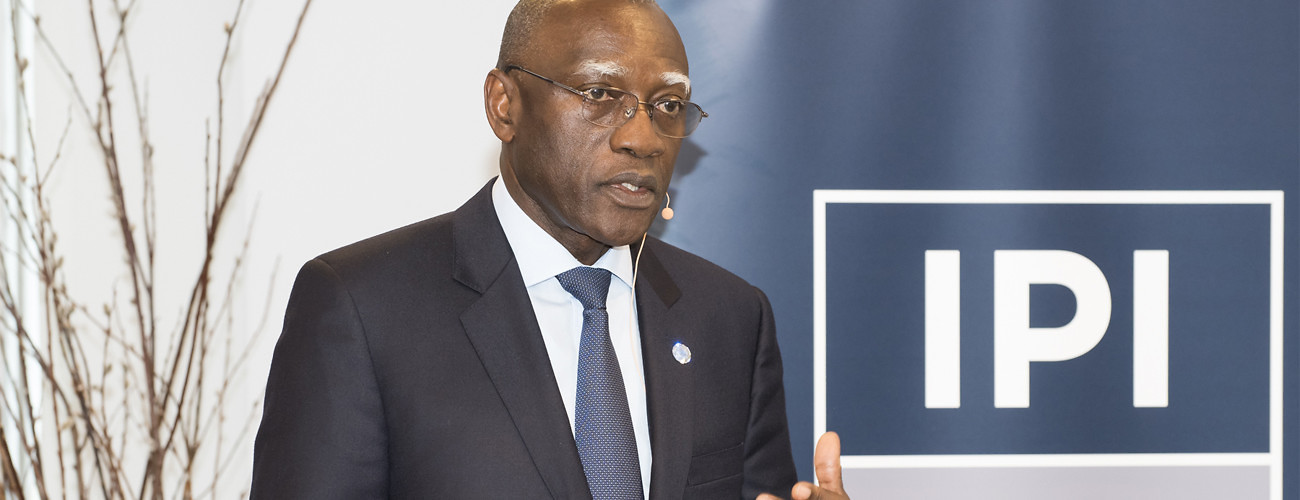One year after the establishment of the UN’s peacekeeping mission in the Central African Republic (CAR), the peace process in the country is making some progress, but reconciliation is still the key challenge for the war-torn country, said Babacar Gaye, United Nations special representative and head of the UN mission in CAR.
Speaking at IPI two weeks before the Bangui Forum on National Reconciliation begins on April 27th, Mr. Gaye said the UN Multidimensional Integrated Stabilization Mission in CAR (MINUSCA) has seen gradual improvement in the country but that without a full commitment to reconciliation, sustainable peace will remain elusive.
“Unless reconciliation is carried out, there will be no sustainable stability in this country,” he said. The ethnic-based violence that has engulfed CAR since the end of 2013 has left deep marks, Mr. Gaye said, to the extent that it is still very difficult for people to dissociate the Muslim community as a whole from the actions of former members of the Seleka militias.
“This collective guilt could be lifted with community-based initiatives that allow for grievances to be heard and possibly compensation,” Mr. Gaye continued. “In that regard, the transitional authorities could demonstrate their commitment… by finding a solution that would allow refugees to participate in both the presidential and parliamentary elections.”
The civil war in CAR has been fought primarily in sectarian terms, with Christian anti-Balaka militias going after the Muslim Seleka in retaliation for the latter’s violence during and after the overthrow of former president François Bozizé in March 2013. But the violence hasn’t been limited to the militias, and the anti-Balaka have targeted Muslim civilians indiscriminately, destroying mosques and forcing thousands of people to flee into neighboring countries. The security crisis has since turned into a humanitarian one as well, Mr. Gaye said.
And that’s a very important dimension, he said, because it is through humanitarian needs that international support has been mobilized and the peacekeeping mission established. “Today 2.7 million out of a population of 4.5 million are in dire need of humanitarian support,” he said. “One million are displaced or refugees in neighboring countries. And since January, despite our work, 50,000 additional IDPs [internally displaced persons] are being registered.”
Mr. Gaye said MINUSCA has managed to limit the damage by making protection of civilians (POC) one of its priorities and by guarding persecuted communities. The mission, together with other international forces deployed to the country, has received praise from the Security Council “for helping prevent genocide,” he said.
That said, Mr. Gaye said humanitarian colleagues have complained to him, saying that peacekeepers should be doing more to protect civilians. “This is not entirely fair,” Mr. Gaye said, “because POC is not just about soldiers. It’s about a global approach.”
Mr. Gaye, a former army general, said it’s an approach that includes prevention, presence, the adoption of proactive measures, a careful understanding of local dynamics, and the provision of early warning mechanisms. In that regard, MINUSCA faces the same challenges that all peacekeeping missions do, he added, namely, the unequal relationship between the strength of the mission and the size of the population to be saved.
Despite the fact that Bangui has experienced relative stability in recent months, the situation in rural areas remains critical, Mr. Gaye said. “[There,] armed groups are portraying themselves as defending the legitimate grievances of the population,” the problem being, however, that while those grievances are legitimate, the groups are not. To stem the violence, Mr. Gaye said the government has called for an active push against the militias, but “one of our roles,” he explained, “is to try to make the government understand that the only viable way is the negotiated way—not forcible disarmament.”
This all relates to MINUSCA’s mandate, Mr. Gaye said.
“We have no offensive mandate in the CAR, but we have rules governing the use of force,” he noted. That means that sometimes the mission will have to resort to force, for instance in self-defense or to defend the mandate itself, he explained. “There are times when our action may look like war, but it is not a campaign. We are there to support the political process first of all.”
The Bangui Forum, Mr. Gaye said, is the culmination of this process. CAR is scheduled to hold elections in August, and although some of the officials currently in power under the transitional agreement have hinted at possibly running—something they are not supposed to do under the terms of the transition process—Mr. Gaye said he is confident they will abide by their commitments.
The conversation was moderated by IPI Senior Adviser for External Relations, Warren Hoge.
Watch event:








